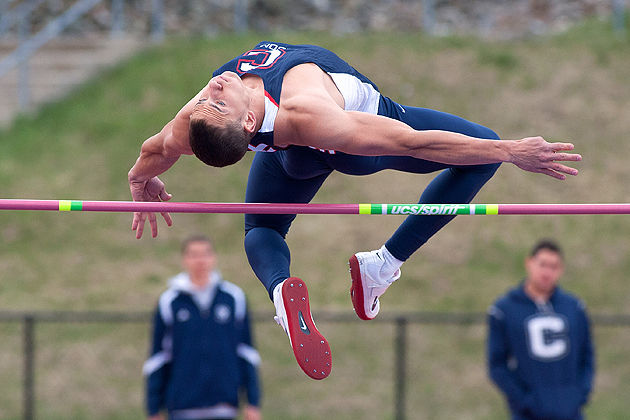Update: Jake Waruch was forced to withdraw from the 2012 NCAA Outdoor Championships on Wednesday, after pulling his hamstring in warm-ups at the Outdoor NCAA Championships.

At the 1912 Stockholm Olympics, Jim Thorpe was told by King Gustav V of Sweden that he was “the best athlete in the world” after winning the decathlon, the 10-event track and field competition that still carries the same imprimatur at the international level.
In the Big East this year, Jake Waruch ’12 (CLAS) won the decathlon during both the indoor and outdoor seasons in men’s track and field. Does he consider himself the best athlete in the conference?
“I get kidded from time to time,” he says. “It’s always the next meet for me. I always feel whenever you get complacent in anything, you have a tendency to fall behind. I made a promise to myself to keep going as long as I can while I’m able to compete. I want to maximize my potential as best as I can.”

The next competition for Waruch will be the NCAA Championships in Des Moines, Iowa, when he will compete against the best college decathletes in the nation on June 6 and 7.
Waruch arrived in Storrs as a 400-meter runner and was moved to what is called a multisport position. In addition to running track in high school, he played football and basketball.
“I always knew I couldn’t do just one thing. I had to do something a little bit different,” he says about his sports experience.
Associate head coach Rich Miller ’95 (ED) says molding an athlete with multiple skills into a successful decathlete is like creating a work of art.
“Different kids handle different volumes of work and pick up things quicker or slower,” Miller says. “It’s definitely a challenge. It takes a lot of creativity in devising a program to meet their potential. It’s a challenge to put in the amount of time between school, the time spent doing the events, as well as getting a sense of how much their bodies can handle.”
The decathlon is a two-day competition, with athletes compiling points in five events each day. The first day is the 100-meter dash, long jump, shot put, high jump, and 400-meter race. The second day is the 110-meter hurdles, discus, pole vault, javelin, and 1500-meter race.

Waruch says focusing on each event as it takes place is a key to maintaining focus on the overall goal of winning a 10-event competition.
“You have to have a short-term memory,” he says. “I go into the first event, the 100-meter, thinking I’m a 100-meter runner; that’s all I think about. You can’t think about the long jump when you’re running the 100. Then you go to long jump and you’re a long jumper now. Even if you ran a bad 100, there’s nothing you can do about it. You have to be very disciplined, let the past go, and not think too far ahead of yourself.”
During a competition, Miller will offer reminders – which they refer to as “cues” – to Waruch about what to focus on in a specific event taking place at the time.
“With these guys doing so many different events, it’s easy to pay attention to too many things,” Miller says. “We try to hone in on what they respond best to; the cues that allow them to hit the reset button, refocus, reground them in the fundamentals of the event.”
Waruch is having his most successful season, after missing his junior year due to injury and illness. He contracted an illness after a tick bite, broke his wrist during a weight-lifting session, and then had a bout of pneumonia. “They say bad things come in three; that was my three,” he says.
Miller says Waruch is a great competitor. “He understands what it means to compete,” he says. “He’s better when he steps into a competition than he is in practice. He’s got a tremendous work ethic. A lot of the guys do who attain this level. The decathlon breeds a certain personality.”
Waruch is looking forward to testing himself against the top decathletes from other top college track and field programs.
“I get to go out there and compete in every event against the best in the nation,” he says. “I’ve put up the scores I have because I go to every event, and my goal is to win every event. I’m excited for it, to push myself.”


